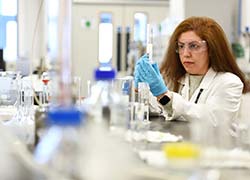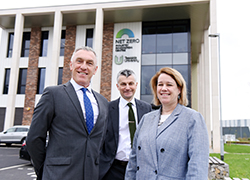Teesside team aiming to cut Europe’s energy bill
Academics from the University are key players in a multi-million pound project which aims to improve energy efficiency in homes and offices without compromising comfort.
A ten-strong team from Teesside are part of a £3.2m research project working to improve energy efficiency in the construction industry and the EU by 20% before 2020.
The energy used to heat homes and offices consumes almost 40% of the total energy used across Europe and the current energy crisis, which has seen oil prices rocket and gas supplies dwindling, has set alarm bells ringing in Brussels.
Professor Nashwan Dawood, the University of Teesside’s Cecil M Yuill Professor of Construction and Director of the Centre for Construction Innovation & Research, and his research team are contributing to the project known as IntUBE - Intelligent Use of Buildings' Energy Information.
IntUBE has brought together researchers and business partners from nine countries with the aim of helping the construction industry and the EU vastly improve energy efficiency.
Professor Dawood was invited to join the project because he is an international expert on using virtual technologies to examine energy efficiency.
He said: ‘Part of the answer is to use IT technology to intelligently analyse and control the consumption of energy, not just in new buildings, but also in existing homes and offices.
‘Of course, we could simply tell everyone to cut down on heating and lighting, but that is not likely to work. If our offices become unbearably hot, people will reach for the air-conditioning or, if it gets too cold at home, hit the central heating button.
‘The key is to give the individual more information about his or her energy consumption and more intelligent control-systems that will allow people to use their energy in a much more efficient way.’
Professor Dawood stressed that the EU will never reach its ambitious 20% target to improve energy efficiency if it only concentrates on new and renovated buildings - and that’s where IntUBE comes in.
He added: ‘We want to increase life-cycle energy efficiency of buildings without compromising the comfort or performance. We will achieve this by integrating the latest developments in the ICT-field into intelligent building and neighbourhood management systems and by presenting new ICT-enabled business models for energy information related service provision.’
The researchers hope the results of IntUBE will create well-performing buildings that use natural resources, resulting in fewer environmental effects and reduced life-cycle costs of energy.
 Supporting Nigerian farmers by transforming food waste into
...
Supporting Nigerian farmers by transforming food waste into
... International partnership signed with prestigious American
...
International partnership signed with prestigious American
... Teesside University academics join prestigious network of
...
Teesside University academics join prestigious network of
...